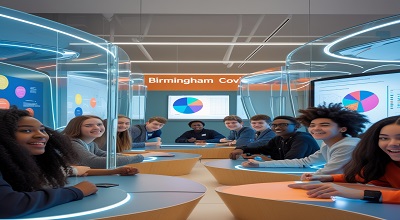Birmingham Covington School
Birmingham Covington School: In the evolving landscape of education, Birmingham Covington School (BCS) stands out as a pioneering institution dedicated to fostering a student-centered learning environment. Located in Bloomfield Hills, Michigan, BCS has gained national recognition for its innovative approach to education, emphasizing project-based learning, collaboration, and real-world problem-solving.
This in-depth blog post explores how Birmingham Covington is redefining modern education by prioritizing student agency, personalized learning, and 21st-century skills. We’ll delve into its teaching methodologies, curriculum design, technological integration, and the impact of its strategies on student success.
The Vision Behind Birmingham Covington’s Student-Centered Model
Birmingham Covington School was founded with a mission to prepare students for the complexities of the modern world by shifting away from traditional, teacher-led instruction. Instead, BCS focuses on:
- Student-driven inquiry
- Critical thinking and creativity
- Real-world application of knowledge
The school’s philosophy is rooted in the belief that students learn best when they are actively engaged in their education. By fostering curiosity and independence, BCS empowers learners to take ownership of their academic journeys.
Key Features of a Student-Centered Learning Environment
Personalized Learning Paths
At BCS, each student’s learning experience is tailored to their strengths, interests, and pace. Teachers use adaptive learning technologies and differentiated instruction to ensure that every child receives the support they need.
Project-Based and Experiential Learning
Instead of relying solely on textbooks, students engage in hands-on projects that solve real-world problems. For example:
- Designing sustainable cities
- Creating tech-based solutions for community issues
- Collaborating with local businesses on innovation challenges
Collaborative Classrooms
Classrooms at BCS are designed to encourage teamwork and peer learning. Flexible seating arrangements, group discussions, and interdisciplinary projects help students develop communication and leadership skills.
The Role of Technology in Enhancing Student Learning
BCS integrates cutting-edge technology to support its student-centered approach:
- 1:1 Device Programs (laptops/tablets for all students)
- Coding and Robotics Labs
- Virtual Reality (VR) for immersive learning
- AI-powered learning platforms for personalized feedback
This tech-rich environment ensures that students are not just consumers of information but creators and innovators.
Teacher and Student Dynamics at Birmingham Covington
Educators as Facilitators
Teachers at BCS act as guides rather than lecturers, helping students explore topics deeply through:
- Socratic seminars
- Mentorship programs
- Reflective learning journals
Student Autonomy and Leadership
Students are encouraged to:
- Set their own learning goals
- Lead peer-teaching sessions
- Participate in school governance
This fosters confidence, responsibility, and self-motivation.
Measuring Success: Outcomes and Achievements
BCS has demonstrated impressive results:
- Higher standardized test scores compared to traditional schools
- Increased student engagement and attendance rates
- Stronger critical thinking and problem-solving abilities
Additionally, alumni report feeling better prepared for college and careers due to the school’s emphasis on real-world readiness.
Challenges and Solutions in Implementing Student-Centered Education
While the model is effective, challenges include:
- Resistance to change from traditional educators
- Balancing structure with student freedom
- Ensuring equity in access to technology
BCS addresses these by:
- Providing ongoing teacher training
- Using data to refine instructional strategies
- Partnering with community organizations for resource support
How Other Schools Can Adopt Similar Models?
Schools looking to replicate BCS’s success should:
- Start with a pilot program in select grades.
- Invest in teacher professional development.
- Integrate technology thoughtfully.
- Engage parents and the community in the transition.
FAQs About Birmingham Covington’s Approach
1. What makes Birmingham Covington different from traditional schools?
BCS focuses on student-driven learning, real-world projects, and collaboration rather than rote memorization and standardized testing.
2. How does BCS assess student progress without traditional grades?
The school uses competency-based assessments, portfolios, and reflective evaluations to measure growth.
3. Is Birmingham Covington a public or private school?
It is a public school within the Bloomfield Hills School District.
4. How does BCS support students with different learning needs?
Through personalized learning plans, assistive technology, and inclusive teaching strategies.
5. Can parents be involved in the student-centered learning process?
Yes, BCS encourages parent workshops, volunteer opportunities, and collaborative projects.
Conclusion: The Future of Student-Centered Learning
Birmingham Covington School serves as a model for the future of education, proving that when students are given autonomy, real-world challenges, and innovative tools, they thrive. As more schools adopt similar approaches, we can expect a transformative shift in how education is delivered worldwide.
